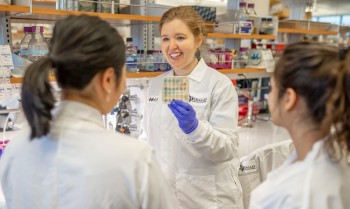Doctor of Philosophy - Molecular Biology
Massachusetts Institute of Technology - 2013
Nicole De Nisco
Associate Professor - Biological Sciences
Professional Preparation
Bachelor of Science - Biology
Massachusetts Institute of Technology - 2007
Massachusetts Institute of Technology - 2007
Research Areas
Dynamics of the urinary microbiome in postmenopausal women
Through projects funded by the NIDDK and NIAID the De Nisco lab studies host-pathogen-microbiome interactions that underlie recurrent urinary tract infection (UTI) leveraging advanced imaging, whole genome metagenomic, and mass spectrometry-based metabolomic techniques. The De Nisco lab seeks to inform new therapies for recurrent UTI by interrogating spatial and metabolic relationship between the urinary microbiota and the human host. Available projects include 1) Spatial and temporal dynamics of the urogenital microbiome in postmenopausal women, 2) Metabolic interactions between the urinary microbiota and urogenital tract and 3) Utilization of Glycosaminoglycans by the Urinary MicrobiotaMolecular basis of microbial pathogenesis and host response during recurrent urinary tract infection
The De Nisco lab investigates recurrent urinary tract infection (rUTI) as part of an ongoing clinical collaboration with the Department of Urology at UT Southwestern Medical Center. Dr. De Nisco’s research combines access to clinical samples with techniques from fields of molecular microbiology, cell biology and immunology to discover how both microbe and host contribute to this disease. Examples of available research projects include: 1) characterizing the host inflammatory response during rUTI and elucidating its role in recurrence 2) deciphering the virulence mechanisms of clinically-relevant rUTI pathogens 3) developing new whole cell bacterial vaccines against rUTI and 4) Urovirulence of Klebsiella quasipneumoniae.Publications
Comparison of Urine pH in Postmenopausal Women With a Current, a History of, or No History of Uncomplicated Urinary Tract Infection 2026 - Journal Article
Fluorescent molecular probe for in vivo and in vitro targeting and imaging of an intracellular bacterial infection 2025 - Journal Article
A Generalized Bayesian Stochastic Block Model for Microbiome Community Detection 2025 - Journal Article
MiCoDe: a web tool for performing microbiome community detection using a Bayesian weighted stochastic block model 2025 - Journal Article
Bladder Wall–Embedded Bacteria Associated With Increased Risk of Recurrence After Electrofulguration in Women With Antibiotic-Recalcitrant Urinary Tract Infection 2025 - Journal Article
Function and contribution of two putativeEnterococcus faecalisglycosaminoglycan degrading enzymes to bacteremia and catheter-associated urinary tract infection 2024 - Other
Complete genomes of Limosilactobacillus portuensis and Limosilactobacillus vaginalis isolated from the urine of postmenopausal women 2024 - Journal Article
Function and contribution of two putative Enterococcus faecalis glycosaminoglycan degrading enzymes to bacteremia and catheter-associated urinary tract infection 2024 - Journal Article
News Articles
Study Details Bacteria’s Role in Recurrent Urinary Tract Infections
 A new finding by researchers at The University of Texas at Dallas and UT Southwestern Medical Center shows that several species of bacteria reside in bladder tissue of postmenopausal women who experience recurrent urinary tract infections (RUTIs).
A new finding by researchers at The University of Texas at Dallas and UT Southwestern Medical Center shows that several species of bacteria reside in bladder tissue of postmenopausal women who experience recurrent urinary tract infections (RUTIs).The results, published online April 17 in the Journal of Molecular Biology, represent the first systematic analysis of biopsies from patients in this population. The findings provide a better understanding of the interaction between bacteria and host tissue, which might lead to more effective treatment strategies.
Urinary tract infections (UTIs) are irritating and painful, sometimes debilitatingly so. The majority of UTIs are caused by the bacterium Escherichia coli, which normally lives in human intestines but sometimes gets into the urinary tract, where it is not welcome.